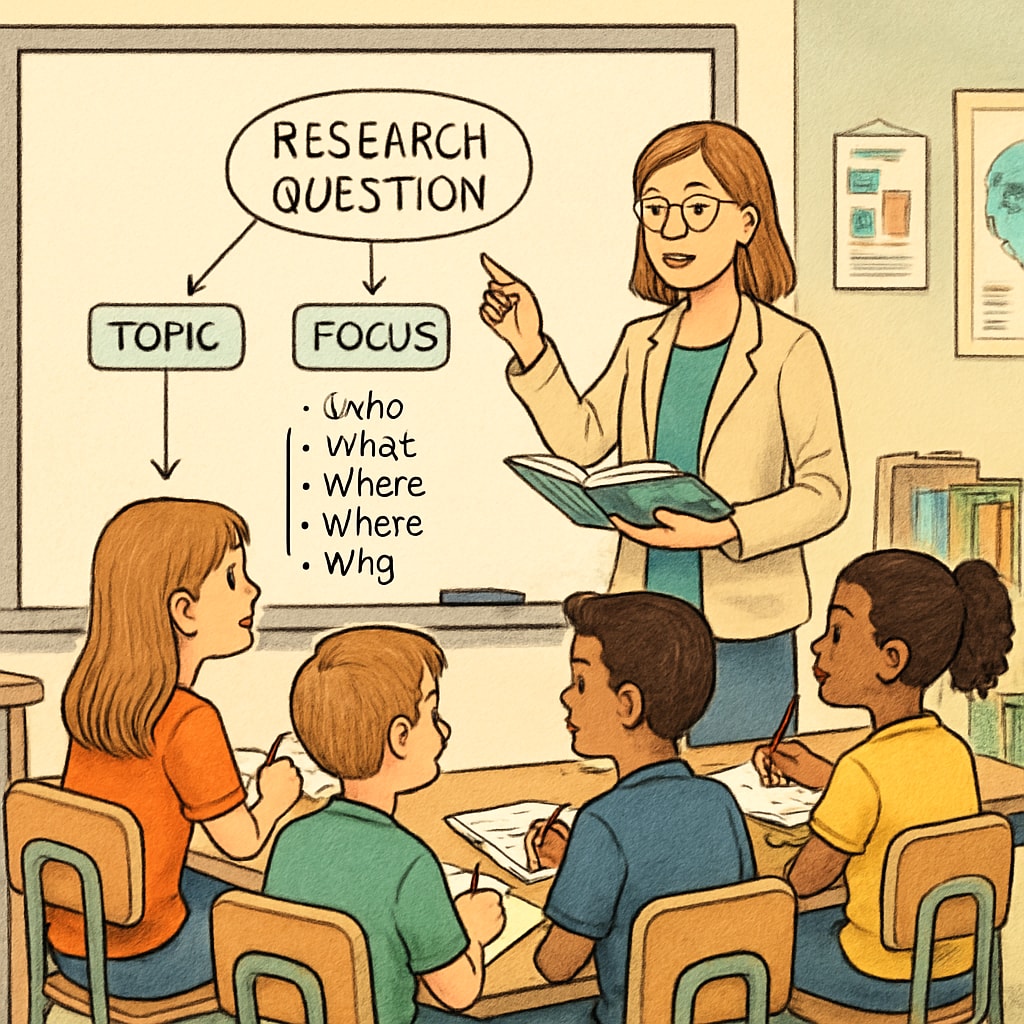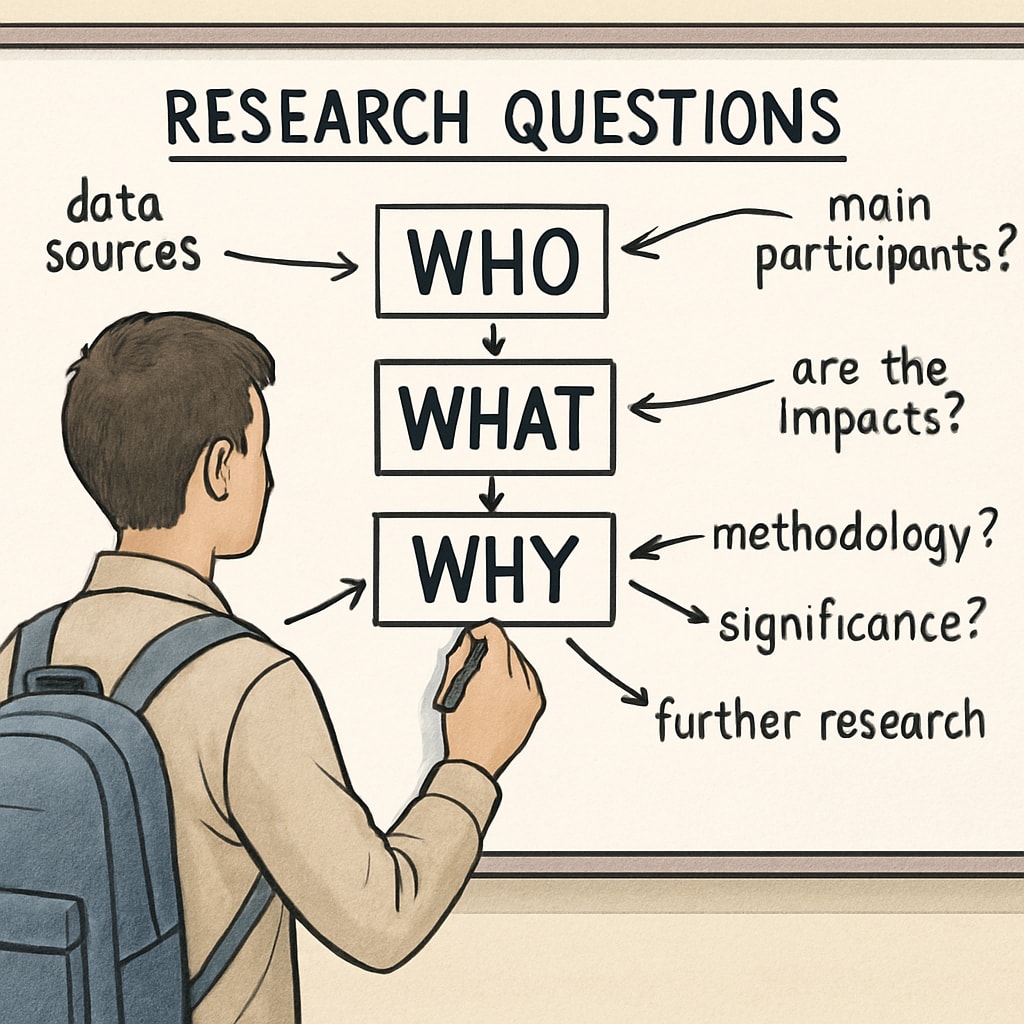Teaching K12 students how to formulate effective research questions is a cornerstone of fostering critical thinking and empowering independent learning. Research question development is not only a critical academic skill but also a tool that encourages students to explore, analyze, and synthesize information. Structured guidance from educators can significantly enhance this process, ensuring students learn to ask questions that are both meaningful and researchable.
The Importance of Teaching Students to Formulate Research Questions
Developing the ability to create strong research questions is an essential skill for K12 students. It lays the foundation for inquiry-based learning, where students take an active role in their education. A well-crafted research question sparks curiosity, provides focus, and establishes a clear direction for investigation. For example, instead of asking vague questions like “Why is water important?” students can learn to refine their inquiry to something more specific, such as “How does access to clean water impact health in developing countries?”
Effective research question formulation also enhances other critical skills, such as:
- Critical thinking: Students learn to analyze problems and identify gaps in existing knowledge.
- Problem-solving: They develop strategies to explore answers systematically.
- Communication: Formulating precise and clear questions improves their ability to articulate ideas.
However, many students struggle with this process due to lack of experience or guidance. This is where educators play a pivotal role.

Strategies for Guiding Students in Research Question Development
Educators can use several strategies to help students develop the skill of formulating research questions. Below are some effective methods:
1. Use the “Question Funnel” Approach
The “question funnel” approach gradually narrows broad topics into specific, researchable questions. For instance:
- Start with a broad topic: e.g., Climate Change.
- Narrow it down by interest: e.g., Effects of Climate Change on Agriculture.
- Refine it into a specific question: e.g., How does climate change affect crop yields in the Midwest?
This structured method helps students focus their curiosity and avoid overly general or unanswerable questions.
2. Model the Process
Teachers can model research question formulation by walking through examples in class. For instance, when discussing a topic like renewable energy, demonstrate how to move from a general interest (“renewable energy sources”) to a specific, researchable question (“What are the economic benefits of solar energy adoption in rural areas?”).
3. Employ the “5Ws and H” Framework
The “5Ws and H” (Who, What, Where, When, Why, and How) is a simple yet effective framework to guide question creation. For example:
- Who: Who benefits most from solar energy?
- What: What challenges prevent wider adoption of solar panels?
- Why: Why is solar energy more sustainable than fossil fuels?
This framework ensures that questions are comprehensive and cover multiple dimensions of a topic.

Practical Exercises to Build Research Question Skills
Practice is essential for mastering research question formulation. Here are some classroom activities educators can use:
1. Question Sorting Activity
Provide students with a list of sample questions. Ask them to sort these into categories: broad, narrow, or specific. Discuss why certain questions are more effective for research purposes.
2. Peer Review of Questions
Have students draft research questions based on a topic of their choice. Then, organize peer reviews where classmates provide constructive feedback on how to improve each question’s clarity and focus.
3. Reverse Engineering
Provide students with a research study or article and ask them to infer the original research question. This helps them understand how well-crafted questions drive meaningful investigations.
Conclusion: The Role of Educators in Shaping Inquiry
Helping K12 students formulate research questions is a vital step in nurturing lifelong learners. By using structured methods such as the “question funnel,” modeling, and frameworks like “5Ws and H,” educators can guide students toward crafting questions that inspire deeper inquiry. Incorporating practical exercises ensures that these skills are not just theoretical but are actively applied in real-world contexts.
With consistent practice and guidance, students will not only excel academically but also develop critical thinking and problem-solving skills that serve them throughout their lives.
Key Takeaway: The ability to ask effective research questions is a skill that empowers students to explore, analyze, and innovate. By fostering this ability, educators play a crucial role in preparing students for a future driven by inquiry and discovery.


